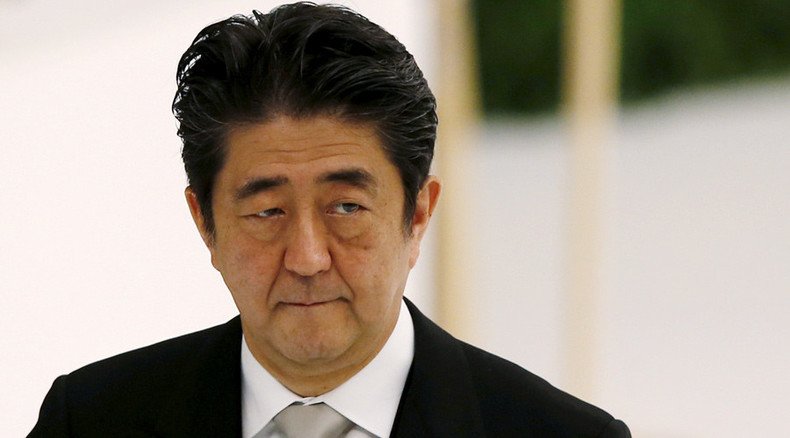Japan’s PM refuses to attend WWII-end anniversary in China

Japanese Prime Minister Shinzo Abe won’t attend the 70th anniversary of the end of World War II in China next month. It comes on the backdrop of the Japanese taking to the streets in a series of protests against Abe’s militarist policies.
“[Abe] will not attend the ceremony on September 3,” Chief Cabinet Secretary Yoshihide Suga told journalists at the Monday news conference.
“[There are no plans for Abe] to visit China immediately before or after that date, either,” he added, as cited by the Asahi Shimbun daily. “The decision was made based on the circumstances of [Japan’s two-chamber parliament] the Diet and other considerations.”
Japan 'interested' in joining NATO missile building consortium – report http://t.co/qqRgEecNTlpic.twitter.com/cUbDYuw2hy
— RT (@RT_com) July 10, 2015The Abe administration is keen to enact the new laws during the current parliamentary session, which was extended to September 27.
The daily also reports that Abe fears that attending the ceremony would not be looked well at by Tokyo’s allies. Western leaders are also staying away from the military parade in China.
The Japanese government will continue to look for a chance to realize a bilateral summit meeting by the end of this year, though.
“With China, we will make efforts to bolster bilateral relations by trying to set the stage for the leaders of the two countries to engage in candid discussions on the sidelines of international meetings and other occasions,” Suga said.
READ MORE: Japan joins US-Aussie military drills amid regional tensions
China is set to hold a military parade on September 3, marking what the Chinese media call “Victory of the Chinese people's war against Japanese aggression.”
During World War II, Japanese forces are estimated to have murdered millions of Chinese civilians. Chinese authorities accuse Japan’s leaders of their inability to fully admit their guilt.
Russia, China kick off active phase of Sea of Japan naval drills http://t.co/sNsX5zZ0IPpic.twitter.com/4u9EWg1laD
— RT (@RT_com) August 24, 2015In a speech earlier in August, Abe stopped short of a full apology over Japanese wartime atrocities although expressing “utmost grief and… eternal, sincere condolences.” One of the particularly sore points for China is that Chinese women were used as sex slaves by the Japanese army. However Abe did not tie it directly to Japan’s actions.
“We will engrave in our hearts the past, when the dignity and honor of many women were severely injured during wars in the 20th century,” Abe said. “Upon this reflection, Japan wishes to be a country always at the side of such women’s injured hearts.”
Thousands rally in #Japan against controversial overseas military deployment bill (PHOTOS) http://t.co/baCfjG3Z5vpic.twitter.com/83SJJk7Fom
— RT (@RT_com) August 23, 2015The two countries’ relations have improved slightly, following their leaders’ two meetings over the past year, but are still far from warm.
Abe has been viewed as the leader with very militarist-oriented views, contrary to Japan’s pacifist policy over the last few decades.
READ MORE: Japan’s parliament panel greenlights military deployment law
Just a couple of days ago, thousands of young Japanese rallied to protest against the pre-approved bill to expand self-defense forces and let the Japanese military participate in foreign operations. Activists in 60 cities took part in the demonstrations.
In July, 56 percent of Japan’s people were against the military policy, while only 26 percent supported it, according to a poll by the Asahi Shimbun.
About a fortnight ago, Japan joined the drills with the US and the Philippines in the South China Sea for the first time, causing concern in many of its neighbors including China.
Japan stages 1st regional drills with West http://t.co/9xT55b3NHYpic.twitter.com/b3LWdKQ54X
— RT (@RT_com) August 16, 2015Last month, Japan reportedly voiced its interest in joining a NATO missile building consortium, with the US supporting the plan.
This all comes in the framework of the ‘Asian pivot’ strategy voiced by the US in 2011, in ‘America’s Pacific Century’ article in the Foreign Policy outlet, penned by Hillary Clinton.
Clinton noted that almost 50 percent of the world's population live there, making its development essential to US economic and strategic interests.
On the other hand, regional players have been showing dissatisfaction with China over its claims on most of the South China Sea. Beijing has been assertive in building up its military as well, which includes artificial islands with massive artillery.
Territorial claims have been overlapping there, while the Japanese and the Chinese have a separate argument over in the East China Sea as well.
LISTEN MORE:












